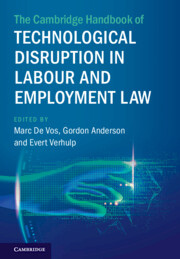Book contents
- The Cambridge Handbook of Technological Disruption in Labour and Employment Law
- The Cambridge Handbook of Technological Disruption in Labour and Employment Law
- Copyright page
- Contents
- Figures
- Tables
- Contributors
- 1 Technology and Law for the Future of Work We Want
- 2 The International Labour Organisation and the Future of Work
- 3 The Digitalisation of Work and the EU: Jurisprudential and Regulatory Responses in the Labour and Social Field
- 4 The Impact of Technological Disruption on German Labour Law: Risks and Opportunities
- 5 Austria: The Corporatist Perspective on Technological Disruption
- 6 Technological Disruption in Employment and Labour Law in the Netherlands
- 7 The Digitalisation of Labour Law in France
- 8 Italian Labour Law: Trends and Developments Put to the Test of Technological Disruption
- 9 Spain: Towards a New Architecture for Labour Law Institutions
- 10 Technological Developments and Industrial Relations in Denmark
- 11 Poland: Old and New Legal Concepts in the Changing World of Work
- 12 Technological Disruption and the Evolution of Labour Law in Hungary
- 13 Digitalisation and Disruption of Labour Relations in Estonia
- 14 Israel: New Trends in Israeli Labour and Employment Law
- 15 United Kingdom: Labour Law and Technological Authoritarianism at Work: Past, Present, and Future
- 16 Old Problems and New Technologies in the American Workplace
- 17 Australia: Reimagining the Regulation of Work
- 18 Technological Disruption and the Future of Work in Aotearoa/New Zealand
- 19 Technological Disruptions in Labour and Employment Law: South Africa
- 20 Japan: Labour Law and Policy in an Era of Technological Innovation
- 21 The Republic of Korea: Old Regulations and New Challenges in the World of Work
- 22 Technological Disruption and Labour Law: Between Utopia and Dystopia
11 - Poland: Old and New Legal Concepts in the Changing World of Work
Published online by Cambridge University Press: 07 December 2023
- The Cambridge Handbook of Technological Disruption in Labour and Employment Law
- The Cambridge Handbook of Technological Disruption in Labour and Employment Law
- Copyright page
- Contents
- Figures
- Tables
- Contributors
- 1 Technology and Law for the Future of Work We Want
- 2 The International Labour Organisation and the Future of Work
- 3 The Digitalisation of Work and the EU: Jurisprudential and Regulatory Responses in the Labour and Social Field
- 4 The Impact of Technological Disruption on German Labour Law: Risks and Opportunities
- 5 Austria: The Corporatist Perspective on Technological Disruption
- 6 Technological Disruption in Employment and Labour Law in the Netherlands
- 7 The Digitalisation of Labour Law in France
- 8 Italian Labour Law: Trends and Developments Put to the Test of Technological Disruption
- 9 Spain: Towards a New Architecture for Labour Law Institutions
- 10 Technological Developments and Industrial Relations in Denmark
- 11 Poland: Old and New Legal Concepts in the Changing World of Work
- 12 Technological Disruption and the Evolution of Labour Law in Hungary
- 13 Digitalisation and Disruption of Labour Relations in Estonia
- 14 Israel: New Trends in Israeli Labour and Employment Law
- 15 United Kingdom: Labour Law and Technological Authoritarianism at Work: Past, Present, and Future
- 16 Old Problems and New Technologies in the American Workplace
- 17 Australia: Reimagining the Regulation of Work
- 18 Technological Disruption and the Future of Work in Aotearoa/New Zealand
- 19 Technological Disruptions in Labour and Employment Law: South Africa
- 20 Japan: Labour Law and Policy in an Era of Technological Innovation
- 21 The Republic of Korea: Old Regulations and New Challenges in the World of Work
- 22 Technological Disruption and Labour Law: Between Utopia and Dystopia
Summary
Polish labour law is mainly statutory law, while collective labour agreements play only a secondary role. The basic concepts are regulated by the Labour Code (LC). Under Article 2 LC, an employee is a person employed on the basis of an employment contract, an appointment, an election, a nomination, or a cooperative employment contract, while, according to Article 3 LC, an employer is an organizational unit, even if it has no legal personality, or an individual, provided it employs employees. Moreover, Article 22 § 1 LC provides that by establishing an employment relationship, an employee undertakes to perform specific work for the benefit and under the guidance of an employer, and an employer undertakes to employ an employee in return for remuneration. This definition is quite short and does not indicate all the features of an employment relationship. Those are – as determined by the jurisprudence and the legal literature – voluntary character, personal work performance on a continuous basis, subordination, and work performance for the benefit of an employer who carries the risk related to the employment. The legal nature of a contract cannot be determined on the basis of a single factor, only on a comprehensive assessment of the factual situation. There are three types of employment contract: a contract for a trial period, a fixed-term contract, and a contract for an indefinite period of time.
Keywords
- Type
- Chapter
- Information
- Publisher: Cambridge University PressPrint publication year: 2023



